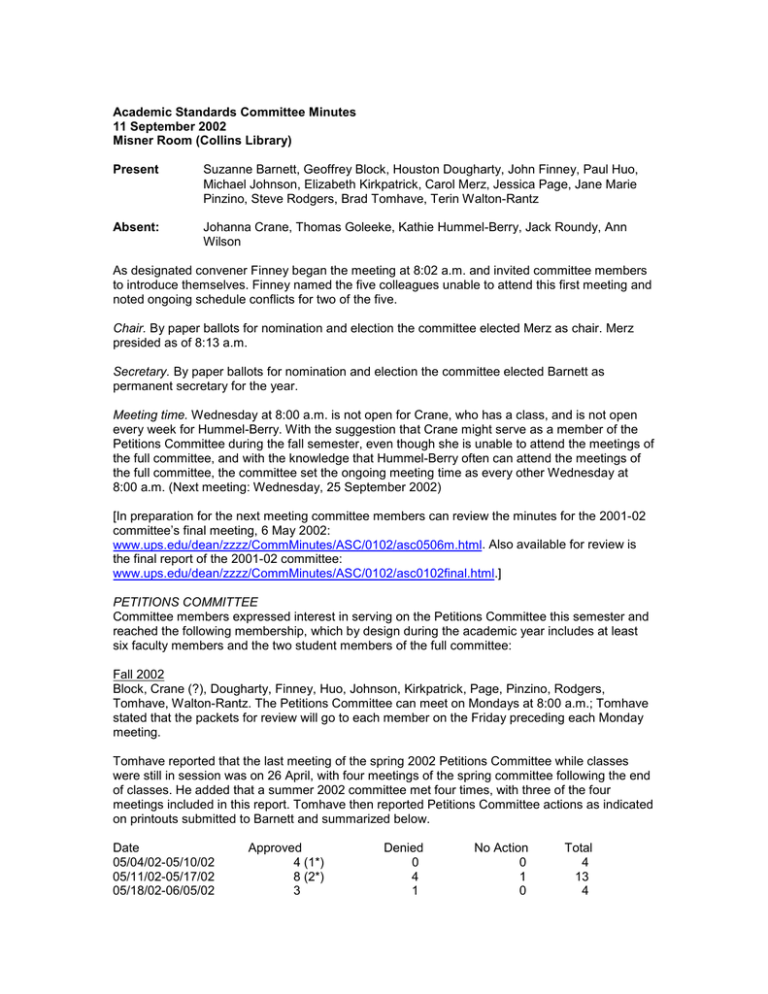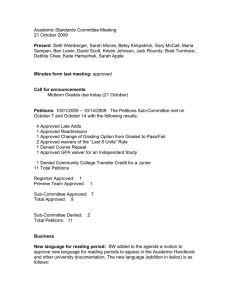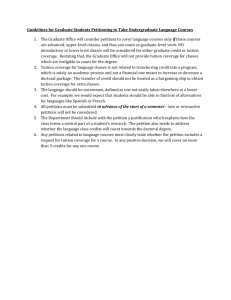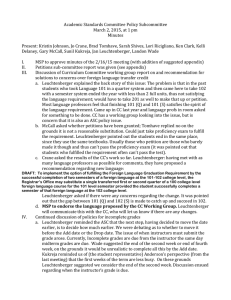Suzanne Barnett, Geoffrey Block, Houston Dougharty, John Finney, Paul Huo,
advertisement

Academic Standards Committee Minutes 11 September 2002 Misner Room (Collins Library) Present Suzanne Barnett, Geoffrey Block, Houston Dougharty, John Finney, Paul Huo, Michael Johnson, Elizabeth Kirkpatrick, Carol Merz, Jessica Page, Jane Marie Pinzino, Steve Rodgers, Brad Tomhave, Terin Walton-Rantz Absent: Johanna Crane, Thomas Goleeke, Kathie Hummel-Berry, Jack Roundy, Ann Wilson As designated convener Finney began the meeting at 8:02 a.m. and invited committee members to introduce themselves. Finney named the five colleagues unable to attend this first meeting and noted ongoing schedule conflicts for two of the five. Chair. By paper ballots for nomination and election the committee elected Merz as chair. Merz presided as of 8:13 a.m. Secretary. By paper ballots for nomination and election the committee elected Barnett as permanent secretary for the year. Meeting time. Wednesday at 8:00 a.m. is not open for Crane, who has a class, and is not open every week for Hummel-Berry. With the suggestion that Crane might serve as a member of the Petitions Committee during the fall semester, even though she is unable to attend the meetings of the full committee, and with the knowledge that Hummel-Berry often can attend the meetings of the full committee, the committee set the ongoing meeting time as every other Wednesday at 8:00 a.m. (Next meeting: Wednesday, 25 September 2002) [In preparation for the next meeting committee members can review the minutes for the 2001-02 committee’s final meeting, 6 May 2002: www.ups.edu/dean/zzzz/CommMinutes/ASC/0102/asc0506m.html. Also available for review is the final report of the 2001-02 committee: www.ups.edu/dean/zzzz/CommMinutes/ASC/0102/asc0102final.html.] PETITIONS COMMITTEE Committee members expressed interest in serving on the Petitions Committee this semester and reached the following membership, which by design during the academic year includes at least six faculty members and the two student members of the full committee: Fall 2002 Block, Crane (?), Dougharty, Finney, Huo, Johnson, Kirkpatrick, Page, Pinzino, Rodgers, Tomhave, Walton-Rantz. The Petitions Committee can meet on Mondays at 8:00 a.m.; Tomhave stated that the packets for review will go to each member on the Friday preceding each Monday meeting. Tomhave reported that the last meeting of the spring 2002 Petitions Committee while classes were still in session was on 26 April, with four meetings of the spring committee following the end of classes. He added that a summer 2002 committee met four times, with three of the four meetings included in this report. Tomhave then reported Petitions Committee actions as indicated on printouts submitted to Barnett and summarized below. Date 05/04/02-05/10/02 05/11/02-05/17/02 05/18/02-06/05/02 Approved 4 (1*) 8 (2*) 3 Denied 0 4 1 No Action 0 1 0 Total 4 13 4 2 06/06/02-06/27/02 06/28/02-07/11/02 07/12/02-08/15/02 08/16/02-08/28/02 9 9 (4*) 10 (2*) 1 1 1 0 1 0 0 0 0 10 10 10 2 * Parenthesized numbers indicate the number of the stated actions done by the Office of the Registrar as authorized by the Academic Standards Committee for resolution of specific issues of registration. YEAR-END SUMMARY Date Approved 08/16/01-08/28/02 275 (89*) Denied 63 (2*) No Action 1 Total 339 Tomhave then explained that actions done by the Office of the Registrar in response to petitions “under prescribed conditions” is by delegation of authority by the Academic Standards Committee. He distributed a document enumerating specified conditions, and the committee took action to renew the delegation of authority: ACTION: Tomhave M/S/P that the committee again endorse the authority delegated to the Office of the Registrar [to act on petitions]. Note: The document appears with these minutes as appended below. Tomhave announced that the fall semester probation-dismissal meeting of the Petitions Committee would take place after 7 January 2003. Also attending this meeting will be colleagues from the Office of Academic Advising. AGENDA ITEMS FOR THE YEAR Finney distributed a document including charges to the committee from the Faculty Senate (items 1-7) and adding recommendations for the faculty in the report of the Retention Committee (items 8-11), along with three “other possible charges” (items 12-14). Note: The document appears with these minutes as appended below. Reduction of the work of the Petitions Committee? Finney then elaborated on item 14 (“Consideration of offer from academic administrative officers to relieve faculty of some of the student petition burden”) and distributed a document outlining the offer, which comes in the context of the Fall Faculty Conversation on 26 August 2002 with regard to faculty time. Note: The document appears with these minutes as appended below. The offer had its origin in discussion by Academic Dean Terry Cooney and Associate Academic Deans Bill Barry and John Finney. The specific offer is as proposed by Finney and would involve the “triumvirate” of Finney, Associate Registrar Brad Tomhave, and Director of Academic Advising Jack Roundy serving as a small group to review petitions and to approve “those the faculty are likely to approve”; any petition for which this group cannot agree on such approval or any petition judged to be lacking a needed component would go on the Petitions Committee. In any event, the small group of three is accountable to the Petitions Committee and to the Academic Standards Committee. Finney proposed the possibility of a trial period, perhaps during the current fall semester. Pinzino expressed appreciation for this proposal and welcomed the idea. Dougharty added his appreciation for the effort and pointed out that it could allow earlier resolution of some petitions. Kirkpatrick stated that the proposal for the initial review by the small group extends the routine delegated authority potentially to all petitions; the principle would be that when the small group is in doubt, the petition would go to the Petitions Committee. Block observed that the effect of the proposal is that one committee will approve petitions while another committee will deny petitions. He welcomes the offer, which will mean that the Petitions Committee will deal only with petitions that are problematic. After Merz’s reminder that the committee might accept the offer on a trial basis, the committee took action as follows: 3 ACTION Kirkpatrick M/S/P to take up the offer to relieve faculty of some [petition] decisions on a trial basis under conditions as stated on the handout document. Dougharty M/S/P adjournment and the meeting ended at perhaps 8:51 a.m. Respectfully submitted, Suzanne W. Barnett 16 September 2002 WY144;asiabook1:ASCmins APPENDED DOCUMENT 1 ACADEMIC STANDARDS COMMITTEE AUTHORITY DELEGATED TO THE OFFICE OF THE REGISTRAR as of FALL 1998 and reaffirmed Fall 2002 (9/11/2002) 1. INDEPENDENT STUDY The Associate Registrar may approve independent study petitions provided: The independent study will be supervised by the student’s major department as indicated by department code for the independent study and by the instructor’s department affiliation. The student’s cumulative gpa is 2.67 or higher. The student has maintained good academic standing. The student’s major gpa is 3.00 or higher. The student has enthusiastic instructor and advisor support. The independent study instructor had another class with the student in which the student earned a grade of ‘B’ or higher. The Independent Study Contract and all required supporting documents complete the requirements described in the Independent Study Policy section of the Logger. 2. LATE ADD The Registration Staff may extend a grace period up to the end of the 2nd week of the Fall or Spring semester to allow a student to register for a course without completing a Late Add Petition provided: The student made arrangements to do so with the staff on or before the last day to add. The student has been attending the class in question since either its first or second meeting. In the judgement of the staff, the student has a good reason for not having registered on time. 4 Following the 2nd week of class, a student may only register with an approved Late Add Petition. The Associate/Assistant Registrar may approve such petitions until the last day for students to drop with an automatic 'W' provided: The student has been attending the class in question since either its first or second meeting; or the student is changing sections of a continuously attended class; or the student is changing levels within a Mathematics or Foreign Language sequence. The student can present a reasonable explanation for not having registered on time. The student has no prior Late Add Petition. NOTE: The “drop-back” period in Language and Mathematics courses is 1 month to allow students and faculty time to properly assess each student’s placement. No petition is required within this period. 3. TIME CONFLICT The Registration Staff may approve petitions to register for courses having time conflicts in the following combinations: Lecture class and a portion of a lab class provided the lecture is fully attended and the missed lab is made-up at another time. Lecture class and a portion of a Music performance group provided the lecture is fully attended and the performance is made-up with another group, attended late, or missed on only one day. Lecture class and a portion of a PE activity provided the lecture is fully attended and the missed PE activity will be made-up at another specific time. Lecture class and a portion of a studio Art class provided the lecture is fully attended and the missed studio is made-up at another time. Lecture class and a portion of a Business Leadership Seminar provided the lecture is fully attended and the missed Seminar is made-up at another time. Two studio Art classes provided one is fully attended and the missed portion of the other is made-up at another time. Lab class and a PE or Music activity provided the lab is fully attended and the activity will accommodate the lab. Lecture class and an audited class provided the lecture is fully attended and no more than 1 hour of the audit is missed and the student can compensate for that missed hour. Note: CRDV 203 Career Awareness is an activity course, but is to be considered a lecture course. The Registrar’s Office may approve a petition for courses having time conflicts to help a student who is a victim of circumstance resulting from a faculty-initiated course schedule change. The Academic Standards Committee reserves the authority to deny any time conflict petition and to approve petitions for the following combinations: 5 Two conflicting lecture classes (unless one is to be audited with no more than an hour missed). The Registration Staff should advise the student that these petitions are sometimes approved under exceptional and compelling circumstances with overwhelming support from both instructors and the advisor. Lecture class and a full lab. Exceptional circumstances with overwhelming support, particularly from the lab instructor, must be presented. This is to overcome the Committee’s natural reluctance to approve this petition because it results in the lab instructor having to teach an additional independent lab and in the student being deprived of a full laboratory experience. Any course combination for consideration by the Registrar’s Office that does not meet the guidelines for Registrar’s approval. APPENDED DOCUMENT 2 Academic Standards Committee Charges and Possible Charges 2002-2003 Charges from the Faculty Senate: 1. Review the "Response to Instances of Plagiarism and Other Acts of Academic Dishonesty". 2. Review the Emergency Medical Withdrawal policy. This charge was made to the 20012002 ASC but was not reviewed because the policy had not been used. 3. Address a request by the Biology Department that students enrolled in Biology 392, Junior Seminar, be exempted from the requirement to pay for academic overloads greater than 4.25 units. 4. Discuss whether any remedies are needed for students in the classes of 2004 and 2005 who may have been unable to take 100-level courses because the courses were filled by upper-level students but also because, owing to policy changes, upper-level students must register last for 100-level courses. [That is, to what extent are some students unfairly caught between two different policies?] 5. Reconsider scheduling-restrictions on seminars vs. labs (i.e., why must three-hour seminars be scheduled at 3:00 p.m. or later?) 6. Examine the consequences--for advisors and advising--of students now being able to drop and add courses on-line, without having to inform their advisors. (Might the Logger, for example, need to include even stronger language indicating that the ultimate responsibility for taking appropriate classes and graduating on time lies with the student?) 7. Reconsider the policy which requires all students to have an advisor in their majors. [Note: Normally the Senate is reluctant to have a committee reconsider a policy the committee just approved the previous year, but in the fall faculty conversation and elsewhere, several colleagues have noted a dramatic and potentially unwarranted increase in the number of their advisees.] Recommendations for the Faculty from the Retention Committee: 8. The committee recommends that the Academic Standards Committee revise its policies for students on academic warning or probation so that such students are required to meet 6 either with someone in Academic Advising or with their faculty advisor to develop a plan for academic improvement. 9. The committee recommends that the faculty review the status and policies relating to reading period because reports by students and other members of the campus community suggest that at least some portion of students view reading period as a time for partying rather than studying. 10. The committee heard from students, faculty members and staff members that some students leave the University because they are not being challenged intellectually in their lower-level courses. The committee respectfully asks the faculty to consider this concern. 11. The committee asks all faculty members to participate in the early alert system. Because only twenty percent of the faculty currently do so, the committee believes that many students may not be receiving the timely help that might enable them to be academically successful. Other Possible Charges: 12. From ASC committee member Alyce DeMarais (on leave fall 2002): the Faculty Planning Group discussed the idea of midterm grades. The members were concerned about the inconsistency surrounding the "U" midterm grades: some faculty assign a U for a midterm grade of F, others for D or F, and still others for a C or lower. We thought this would be a good discussion topic for the ASC; should a campus-wide system for the assignment of U midterm grades be set? 13. Proposed adjustment in the Language of Study Abroad Policy (see handout; Associate Dean Barry will meet with the committee). 14. Consideration of offer from academic administrative officers to relieve faculty of some of the student petition burden (see handout from Associate Dean Finney). APPENDED DOCUMENT 3 Offer to Relieve Faculty of Some of the Student Petitions Burden Proposed by Associate Dean John M. Finney September 11, 2002 Introduction: The faculty, at the August 26, 2002 Fall Faculty Conversation, discussed possible ways of relieving some of the pressures on their time. In this context the faculty expressed strong interest in “reducing faculty participation in governance to essential functions” as a means of creating “a culture of trust.” In response, the academic officers tried to think of ways they could help to facilitate this. One idea was to offer to relieve faculty of some of the burden dealing with student petitions. The Offer: The Petitions Subcommittee of the Academic Standards Committee meets for up to two hours every week to consider student petitions. Some kinds of petitions are regularly approved. The offer is for academic administrative officers to take over initial responsibility for the review of student petitions. In cases where the student’s case is strong and experience indicates the petitions committee has in the past consistently approved similar petitions, the academic administrative officers will approve the petition on behalf of the faculty. In cases where the general will of the faculty is unclear or where the academic administrative officers are inclined not to approve, the petition will be brought to the petitions committee. 7 The goal is to reduce the number of petitions the subcommittee needs to review, thereby saving faculty time. The petitions committee would continue to meet as required, to review the more difficult petitions, and to receive summary reports of petitions approved by academic officers. This arrangement could be viewed as an extension of authority already delegated to the Registrar’s Office, to approve late registration and time conflict petitions when certain conditions are met. All authority to approve petitions rests with the faculty and the faculty could terminate the arrangement at any time. How it Might Work: Students would continue to prepare full petitions, documenting their cases and making their arguments as they do currently. The Associate Dean, the Associate Registrar, and the Director of Academic Advising would meet each week to review petitions. They would approve petitions they unanimously agree are uncontroversial and would likely have been approved by the petitions committee. If agreement is not unanimous, the petition would be forwarded to the committee.





